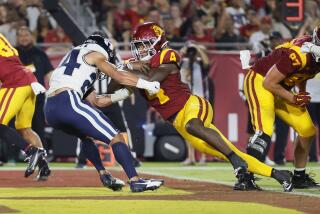Ross Can’t Stop to Enjoy Tech’s Climb
- Share via
ATLANTA, Ga. — Sitting behind his desk in his office at Georgia Tech, Bobby Ross does not look like a football hero. He looks like an overworked, aging 53-year-old, who has not gotten much rest in a very long time.
On the brink of Georgia Tech’s first undefeated season since 1952, when the Yellow Jackets finished No. 1 in the final United Press International poll, Ross is a reluctant hero.
“This is a hard place to coach,” Ross says slowly. “All these nice things have been happening here and I haven’t been able to enjoy it one bit. The first two years were pure agony. I considered quitting after my first year. This job started out being a tough job and it hasn’t stopped. The only thing that has made it a little easier to take is that we’ve started winning.”
He is surrounded by memorabilia and photos of his family. But on the wall behind him is a framed photograph of the six All-Americans on that 1952 national championship team coached by Bobby Dodd. Soon, he might have to add another photo.
Ross will take his No. 2-ranked Yellow Jackets between the hedges at Georgia Saturday, and if Georgia Tech emerges the victor, it also remains the only undefeated NCAA Division I-A football team in the country, headed to the Citrus Bowl against Nebraska.
“People around here have always talked about three coaching legends,” said athletic director Homer Rice. “They talk about John Heisman, Bill Alexander and Bobby Dodd. And now they’re talking about Bobby Ross as the fourth.”
While everyone around him is praising him as the mastermind, Ross describes himself as only “a spoke in a wheel.” He says he confronted problems at Tech he never faced at Maryland, where he coached the Terps for five years and compiled a 39-19-1 record before coming here in 1987.
He says the two keys to turning the Georgia Tech program around were to cut down on player attrition and to establish stability within the program, from head coach on down.
“In four or five years at Maryland, I lost only four or five players,” Ross says. “My first year here, I lost 12 of 27 recruits.”
That was in 1987, when Ross inherited Bill Curry’s recruits. The next year, 1988, which was Ross’s first recruiting year, he lost two of 13. In 1989, it was two of 26. This year it again was two of 26.
“I look at the bottom line,” he says. “Over three years we lost two years of recruiting classes. The big thing we’ve learned is that you have to recruit youngsters who will stay and who are committed to hard work. There is no way around the 15 hours of calculus this university requires.”
On the stability side, Ross has lost only two assistant coaches in the last four years. He said it was a matter of finding coaches with a good work ethic and then getting the university to agree to pay them enough to keep them.
“It is keeping the players and keeping the coaches,” he says. “I don’t know what impact I’ve had on that. ... It’s like the weight program. We’ve got the best facility in the country and it has done more to inspire our kids to commit to a weight program than I have.”
But Ross is the architect. His players attend a mandatory team breakfast daily, so the coaches can keep tabs on who is up and going to class. He has added two full-time academic counselors. There are also mandatory study periods.
Once a week, on Friday mornings before each home game, Ross holds another breakfast. It is “Breakfast with Bobby,” a 7 a.m. buffet open to alumni and fans. For an hour, Ross takes questions and talks football. An average of 100 people attend those breakfasts, which Ross initiated because he felt fans would be less likely to criticize if they knew exactly what was going on. He does a 6 a.m. radio call-in show every day for the same reason.
Tech alumni have not had much to criticize lately.
Kim King, quarterback of the 1966 team that Dodd coached to the Orange Bowl, does the color on Tech radio broadcasts. He and a number of other Tech alums meet to watch football practice once a week.
“I go because I need to know what they’re doing and to get a feel for the game I’m about to broadcast,” he says. “But every week when we meet there, we know there is another reason we all show up. Business in Atlanta is so depressed right now, we say a great way to feel good about yourself is to be around Tech.”
After Bobby Dodd resigned at the end of the 1966 season, Tech had little to feel good about. It went through four coaches -- Bud Carson, Bill Fulcher, Pepper Rodgers and Curry -- and lost more than half its games, going 104-111-7 before Ross arrived on the scene.
Tech had started a string of Atlantic Coast Conference losses in 1986 under Curry and saw it grow to 16 straight under Ross. The Jackets did not beat a Division I-A team in 18 attempts. In Ross’ first year, the team won only two games, both against I-AA opponents. In 1988, it won three times, finally beating a I-A team, South Carolina. Last season, though, Ross’ team started to click.
It started with a come-from-behind victory Oct. 7, 1989. The Jackets rallied for a 28-24, last-second decision over Maryland. It was a win that ended the ACC futility streak. Tech has gone 16-1-1 since that victory.
You would think Ross would be gleeful. Instead, he is thoughtful.
“I don’t know right now, if it (the winning) is worth it,” he says. “It has been such a hard time. I remember at Maryland, after a win, I’d go home and put the tape of the game on, and it would be so enjoyable, so good, to sit there with my family and watch it. I haven’t done that since I’ve been here.
“Well, Alice (Ross’ wife) suggested I watch the last quarter of the Virginia game the other night. She said I might enjoy it. So I watched it, but it didn’t make me feel anything. I send most of the tapes to my son in Japan. I’m not even interested in saving them.”
When Georgia Tech upset then No. 1-ranked Virginia in Charlottesville, 41-38, Yellow Jackets supporters called it the “best win since Coach Dodd’s days.” The praise only brings a shrug from Ross.
“I’m sure Bill Curry and Pepper Rodgers had nice wins, too,” he says. “People forget.”
However, he is delighted his players have been able to experience the emotion that goes with the school’s first ACC football title. It is a reward, not only for the players he recruited, but also for the few who stayed around and adjusted after the departure of Curry.
“I was one of the players that openly debated everything Coach Ross did when he came here,” says fifth-year senior guard Joe Siffri, who was recruited by Curry. “I didn’t like Coach Ross at all. I kept trying to make him do things the way Coach Curry did them. But Coach Ross wouldn’t bend.”
Instead, Siffri found himself bending.
“I used to do things just good enough to get them done,” Siffri says. “Now I work harder, to do them the right way and get the most out of them. I think you get that from Coach Ross in a subliminal way. We’ve all seen Coach Ross persevere through the hard times. I’ve seen him cry. I can’t tell you how much respect I have for him.”
More to Read
Go beyond the scoreboard
Get the latest on L.A.'s teams in the daily Sports Report newsletter.
You may occasionally receive promotional content from the Los Angeles Times.










